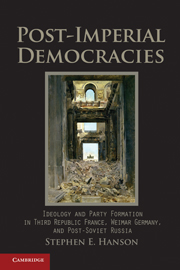 Post-Imperial Democracies
Post-Imperial Democracies Book contents
3 - Ideology and Party Formation
Published online by Cambridge University Press: 05 June 2012
Summary
The link between political parties and ideology is well established, in both social science theory and empirical research. Indeed, if representative democracy without a system of well-organized political parties is “unthinkable,” as Schattschneider famously argued, genuine electoral competition without competing ideologies seems equally hard to imagine. If parties have no stable ideological positions whatsoever, then party labels cannot convey any meaningful information to party activists and voters about the kinds of policies particular party elites are likely to pursue in office. Electoral campaigns in such a situation become a charade, with politicians merely pretending to stake out positions they had no intention of defending once in power – with the result that voters must quickly learn that their participation in the entire game of electoral politics is irrational. Thus, in any stable democracy there will always be some limits in practice on just how much freedom party elites have in “choosing” positions on the ideological spectrum.
Despite this logic, it is fair to say that the primary focus of most of the literature on comparative political parties has been to emphasize not the ideological limits that the need for credibility places upon party behavior but the tendency of partisan “entrepreneurs” to abandon quickly their professed principles for reasons of electoral and political expediency. Thus, the first serious social scientific analyses of comparative party politics at the turn of the twentieth century focused on the rise of unprincipled mass party “machines” in the United States and Western Europe.
- Type
- Chapter
- Information
- Post-Imperial DemocraciesIdeology and Party Formation in Third Republic France, Weimar Germany, and Post-Soviet Russia, pp. 57 - 84Publisher: Cambridge University PressPrint publication year: 2010


